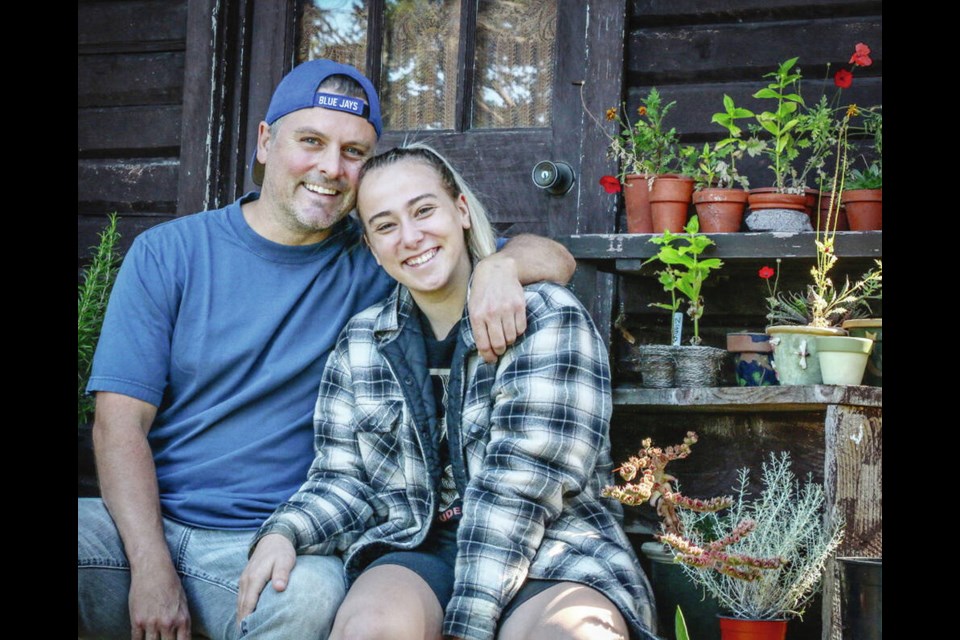Ever tried dandelion-root coffee?
How about maple blossoms drizzled with honey?
Kelp bulbs stuffed with pork, anyone?
There’s plenty of variety on the menu at Chris Hall and Stef Lowey’s place.
The Pender Island couple, who spent a year surviving on only the food they grew, raised, hatched, foraged or fished from their half-acre property, are at it again.
Hall and Lowey ended their 365-day experiment on Aug. 2 last year, after gaining a wealth of knowledge on survival by their own means. They raised pigs, chickens and ducks, grew 75 varieties of vegetables and fruits, fished for crab and prawns and foraged the seashore and their property, designing some creative meals along the way that they say kept them fit and healthy.
Now, after a six-month break during which they indulged in luxuries such as coffee and beer, pizza and ice cream, they’re resuming the strict regimen of self-reliance for everything that goes into their bodies.
The couple attracted more than 45,000 subscribers to their YouTube channel — Lovin off the Land — over the year-long experiment. Their followers are from all over Canada, the United States, Australia and Europe, and “they really kept us motivated,” said Lowey.
Many of them also provided supportive food hacks to help them on their journey, including dandelion-root coffee.
“Coffee was one of the things we missed the most,” said Hall. “And you know there’s no caffeine in dandelions, but it tastes similar — sort of a nutty, chocolate coffee. We’ve got lots of dandelions, so let’s make use of them.”
The couple say they also relied on daily perusals of Google and books for everything from recipes to animal-care tips.
“It’s quite the learning curve,” said Lowey. “We sit down at the end of every day for the important things we have to do the next day … we keep a running list that has basically become our lives.”
Lowey said it was initially difficult to give up processed foods back in 2020, but the couple eventually got used to the idea. The regime filled their days, and both dropped weight as they settled into a healthier, more natural diet.
Since last summer, the two have watched food prices soar as floods, fires and global conflict broke down the supply chain. It got them thinking about returning to self-reliance, and late last month, they started Year 2 of their plan.
“Part of it was the state of the food supply and prices, but we also missed this lifestyle, too,” said Hall. “It shows how reliant everyone is on stores for their basic food and how expensive it is to rely on gas and trucks to bring it to us.”
One difference this year is that the two are allowing themselves “one cheat product” — flour, which will allow them to do more baking, make sourdough breads and recently, a delicious Yorkshire pudding.
“It was a tough choice, because we had to turn down cheese and coffee,” said Hall. “But flour gives us more options.”
They also want to produce about 90% of their animal feeds this year. To do that, they’ve developed a mealworm farm to feed their chickens, ducks, turkeys and quail, and started growing more grains like barley and rye.
The two are also picking up and sorting food scraps from a local restaurant on Pender for their pigs, augmenting the vegetation and scraps they already produce on their land.
They are also experimenting with chicory root — a member of the dandelion family and plentiful on Pender — as another coffee substitute, and have been eating maple blossoms, the young flowers that appear on trees this time of year, Lowey said.
They’ve also increased the number of bee boxes and expanded their bee population to provide a sweetener for baking and other dishes, along with the stevia plant.
Lowey said they’ve added medicinal plants such as rose hip, chamomile and St. John’s wort, and are making spreads from nuts, growing mushrooms in fallen logs and foraging for bladderwrack, a type of seaweed, and sea asparagus along their shore.
The challenge on the Pender property is finding places for garden plots to support more edible plants — the land is heavily treed and largely under shade, and much of the soil is acidic from pine-needle droppings.
There is a steady supply of compost from chicken manure and plant scraps, and they’ve set up gardens in sunny spots where there is a break in the canopy, and others in shade.
They’ve also built a larger water-catchment basin to feed the drip system they built last year from scrap irrigation pipes.
Nearly every inch of the property has plantings, from berries to seedlings. There are patches of beets and bok choy, kale and Brussels sprouts, Swiss chard and rhubarb, lettuce and beans, potatoes, peaches, strawberries, raspberries, blackberries and blueberries.
New this year are red currants, goji and gooseberries, and fruit from fig and cherry trees.
They’ve prepared baked bull-kelp bulbs stuffed with minced pork, snack chips from dried bladderwrack, seaweed salads with veggies and sea asparagus sautéed with oyster mushrooms. They make tea and salads using horsetail plants that grow wild on the property.
Before their lifestyle change, the couple both worked at Poet’s Cove Resort on Pender — Hall, 38, as general manager and Lowey, 24, in the hotel spa.
Hall now co-ordinates a seasonal water taxi between some of the Gulf Islands, and Lowey created a studio at their cabin to do massage therapy.
They certainly aren’t worried about going hungry. Their freezer is “filled with protein” — chickens, ducks and bacon — and they started salting (from the ocean) and curing pork, with 30 pounds of sausage, salami and prosciutto already hanging and soon ready to eat.



